SUMMARY
This is AI generated summarization, which may have errors. For context, always refer to the full article.
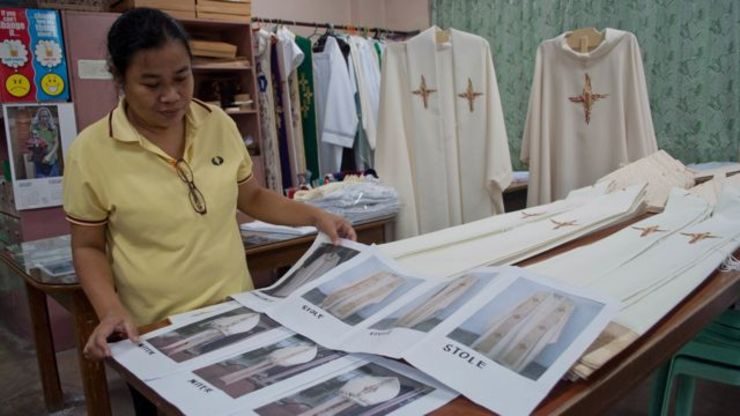
MANILA, Philippines – When Pope Francis appears before Filipinos this week, seamstress Rose Padel will be one of the lucky few who could proudly say she helped make the vestments of the most powerful man in the Roman Catholic Church.
The Samar native is an employee of Talleres de Nazaret, a workshop that specializes in the creation of clerical garments. Its workers have been tapped to create the vestments of Pope Francis and his priest concelebrants for the pontiff’s Philippine trip from January 15 to 19.
The selection of Talleres for the creation of the papal vestment seems to be a symbolic nod to the papal visit theme of ‘Mercy and Compassion.’ Run by Sister Maria Flora Perez, a nun who hails from Santiago de Compostela in Spain, the workshop is known for hiring women workers and those at risk of being driven into exploitation.
“We want to give decent work to these young ladies,” Perez said. “We want to help them help themselves, so that they can, by themselves, have a good future.”
A good future, for Padel, meant following Perez from the provinces and into Manila. The Samar-born seamstress has been under the Spanish nun’s keeping for over a decade, and she now considers Talleres her second home – and the vestments she makes, her own proud creations.
Getting the call
When Padel talks about her years in Talleres, she speaks fondly about it: there’s a proud grin on her face as she recalls how Sister Perez first approached her and took her in when she was living alone in Leyte province.
Padel met the Spanish nun while she was studying in Tacloban City. Learning that the then-16 year old lived alone, Perez invited Padel to live with her. When she moved to Manila, the Samar native followed.
Since 1995, Padel has been working tirelessly around the shop, helping other women workers cut, sew, iron and embroider. These days, she takes orders – including the fateful call.
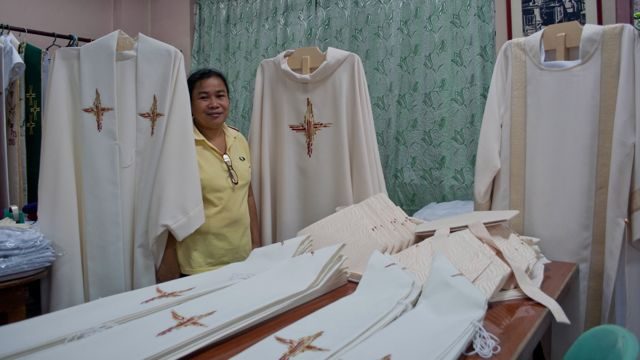
“Fr Carmelo Arada called me one Sunday night in August, asking me to attend a meeting for the papal visit,” Padel recalled. “At first, we thought we were only going to make the vestments for the bishops. We didn’t realize that we were asked to make the vestments for the Pope too.”
Perez wasn’t expecting to be approached too, and when she heard about the call, she feared that they might have to turn it down.
“We felt very happy about it, but we were a little afraid that we cannot finish everything because we already had many orders,” Perez said.
But it was a once-in-a-lifetime opportunity that her own workers did not want to give up.
“The workers were very enthusiastic. They said it was an honor. They worked overtime. They took it very, very seriously,” Perez said.
Vestments fit for a pope
The designs for the chasuble and stole to be used by the bishops and priests were taken from the workshop’s design catalogue. The chosen design was very simple: an embroidered cross, in golden yellow and red, serving as adornments for the garments.
Meanwhile, the design for the Pope’s vestments was made by the Bulacan-based Disenio Sagrado. Talleres ended up creating 4 stoles, one chasuble, and 3 miters for the pontiff.
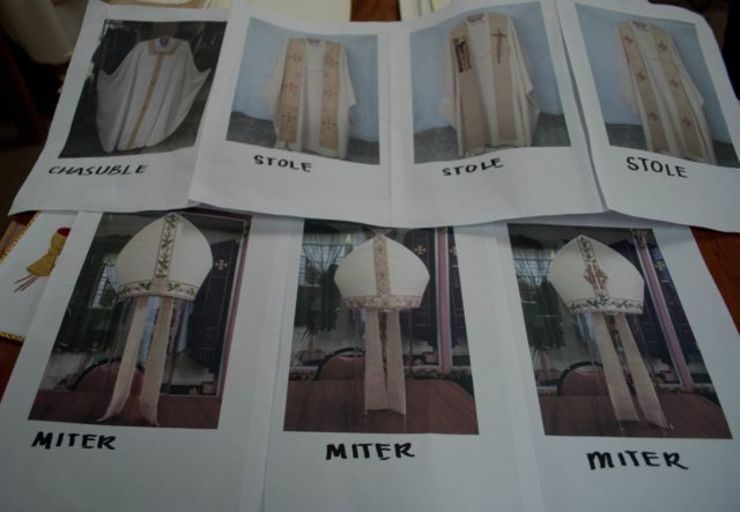
The miters, or ceremonial headdress, featured Filipino elements, such as anahaw leaves, bamboo, and the Philippines’ national flower, the sampaguita.
Perez said that the Pope’s preference for simplicity continues to be reflected in the garments he will wear.
“Most priests here like elaborate [vestments]. This one is very simple. There are not even any tassels! Very simple, but I see it very fitting for a person who is very simple. I like that he likes simple,” Perez said.
But while the designs were simple, the labor was not. The workers experimented on how best to execute the designs, with every detail carefully scrutinized, every piece a labor of love.
“Habang ginagawa namin ito, minsan mapapatigil na lang kami at maiisip kung gaano kahalaga itong ginagawa namin,” Padel said. (While we were working on the vestments, sometimes we just stop and then realize how valuable our work is.)
“Kapag nakita namin si Pope, makikita na binuhos namin ang pagmamahal sa mga suot niya.” (When we see the Pope, we will see that we poured our love into the clothes he will wear.)
More than just workers
The workers of Talleres worked overtime not just because of the papal visit. Padel believes it’s because they truly believe in the value of their work.
“Hindi ako itinuturing na manggagawa dito, kundi pamilya. At ang turing ko rin sa Talleres, parang amin na ito,” she said. (I am not treated as a mere worker here, but as part of a family. I consider Talleres my home, too.)
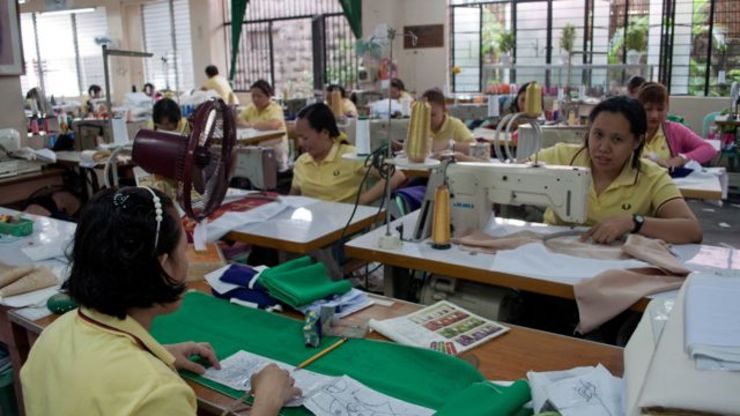
Padel had tried once to work in a snack factory, just to try something different. But the harsh working conditions and hostile environment made her quit, barely a week into the job.
“Siguro soon dahil sa hirap, survival na lang,” she said. (Perhaps because of the difficulty of work, it’s really all about survival.)
But in Talleres, work didn’t feel like work. And even when they had to log countless hours in overtime, Padel said it was still a fulfilling experience to create garments that would be worn by the leaders they revered.
“Dito, kahit pagod, kahit mag-rush, buo pa rin ang pagkatao. Marami akong kakayahan na ibinigay ng Diyos, so kailangang ibigay para mas lalong lumago. Masaya ako rito, dito ang buhay ko.” (Here, even when I’m tired, even when we do rush work, our dignity is still preserved. God has given me many talents, so I need to use that for something meaningful. I’m happy here, my life is here.)
Providing decent work
Years before Talleres would make the vestments of the pontiff hailed as the People’s Pope, Sister Perez was already heeding Francis’ call for mercy and compassion.
The Spanish nun sent to the Philippines in 1962 decided to set up the garment shop after noticing young women falling victim to human traffickers and sexual exploitation.
“There were so many young ladies who were going abroad thinking of working in bars and afterwards ending up in the market of flesh. We thought of doing something for them, but we did not know what would be the best thing,” she said.
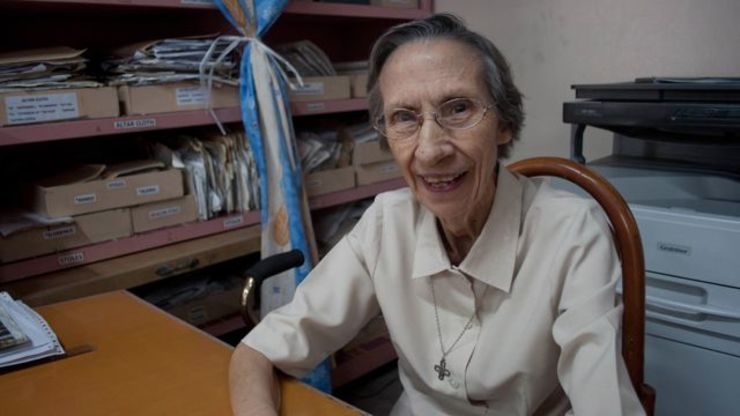
With her fellow nuns, they visited a street in old Manila infamous for prostitution, and spoke to the girls working in the area.
Asked why they resorted to prostitution, the young girls’ answers were the same: Their brothers and sisters needed to go to school. They needed to buy supplies for their homes. They needed food.
“So I said, if you have opportunity to have another work, would you change your work? They said yes,” Perez said.
But the business they had to set up should be doable enough for girls with no higher studies. Perez came up with the idea of creating chasubles for priests, drawing from her interest in the garments when she was a child.
She and her workers did not know how to embroider then, but they found ways. Perez recalled having to learn how to cut the garments by following instructions in a book written in Japanese. From first using silk screens, to finally learning how to embroider and use sewing machines, Talleres began to grow into a community of women workers who were given a chance to earn a decent living.
“We don’t ask them if they know how to work. We don’t tell them that they have to produce this much. We ask them to do it well. We are willing to help them,” she said.
Pope Francis himself emphasized the importance of taking and providing work that does not strip a person of his dignity.
In a 2013 address, he said: “Work is fundamental to the dignity of a person. Work, to use an image, “anoints” us with dignity, fills us with dignity, makes us similar to God.”
Perez wants her workers to understand that they are not beneath anyone, not even the priests and bishops whose garments they create.
“I tell my workers, when the priests and bishops come here, you have the same dignity as them,” Perez said.
“Treat them with respect, but not that you bend down, not that you cannot walk beside them.” – Rappler.com
Add a comment
How does this make you feel?
There are no comments yet. Add your comment to start the conversation.